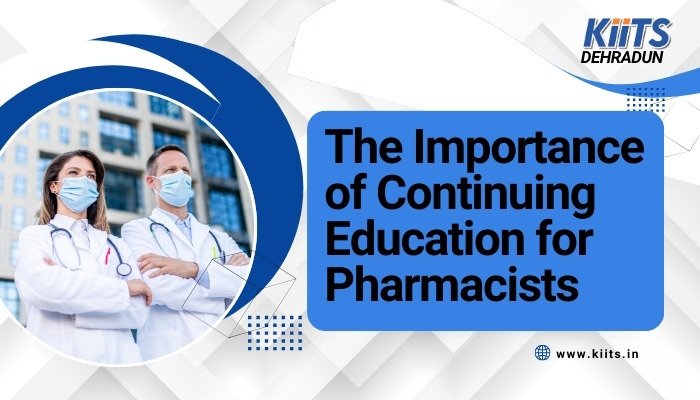Continuing education (CE) is a critical aspect of professional development in many fields, but it holds particular significance for pharmacists. As primary healthcare providers responsible for the safe and effective use of medications, pharmacists must stay abreast of the latest advancements in pharmaceutical science, medical research, and healthcare practices. This article explores the importance of continuing education for pharmacists, highlighting its role in maintaining competence, enhancing patient care, adapting to evolving healthcare landscapes, and fulfilling professional and ethical responsibilities.
Maintaining Competence and Knowledge
Pharmacy is a dynamic field characterized by rapid advancements in drug development, therapeutic practices, and healthcare technologies. To maintain their competence, pharmacists must continuously update their knowledge and skills. Continuing education provides the platform for pharmacists to stay informed about new medications, treatment guidelines, and emerging health threats. This ongoing learning ensures that pharmacists can provide accurate and up-to-date information to patients and other healthcare professionals.
Staying Updated on Medications and Therapies
Pharmaceutical companies are constantly developing new drugs and formulations. In addition to understanding the pharmacokinetics and pharmacodynamics of these new medications, pharmacists need to be aware of their potential interactions with other drugs, side effects, and contraindications. Continuing education programs often focus on these aspects, providing pharmacists with the knowledge needed to advise patients and prescribers effectively.

Enhancing Clinical Skills
Beyond drug knowledge, pharmacists must hone their clinical skills to perform tasks such as medication therapy management, patient counseling, and health screenings. CE courses that offer hands-on training and practical applications enable pharmacists to refine these skills, ultimately improving their ability to deliver high-quality patient care.
Enhancing Patient Care
The primary objective of any healthcare professional is to provide optimal patient care. For pharmacists, continuing education directly impacts the quality of care they can offer. By staying informed about the latest developments in medicine and healthcare, pharmacists can make informed decisions, offer better patient education, and ensure safe medication practices.
Patient Education :-
Pharmacists play a crucial role in educating patients about their medications. Effective patient counseling can prevent medication errors, reduce adverse drug reactions, and improve therapeutic outcomes. Continuing education equips pharmacists with the latest information and communication strategies to enhance their patient counseling skills.
Medication Safety and Management
Medication safety is a core responsibility of pharmacists. Continuing education programs often include updates on best practices for medication management, including strategies to minimize medication errors and prevent adverse drug events. By staying current with these practices, pharmacists can contribute to a safer healthcare environment for their patients.
Adapting to Evolving Healthcare Landscapes
The healthcare landscape is continually evolving, driven by technological advancements, changing patient demographics, and new healthcare policies. Pharmacists must be adaptable and responsive to these changes to remain effective in their roles. Continuing education helps pharmacists navigate these shifts and stay relevant in their profession.
Technological Advancements
Technological innovations, such as electronic health records (EHRs), telepharmacy, and automated dispensing systems, are transforming the practice of pharmacy. Continuing education programs that focus on these technologies enable pharmacists to integrate them into their practice efficiently. Understanding how to use these tools can improve workflow, enhance patient care, and increase operational efficiency.
Emerging Health Trends
The emergence of new health trends and challenges, such as the opioid crisis, antibiotic resistance, and the COVID-19 pandemic, necessitates ongoing education for pharmacists. CE programs addressing these issues provide pharmacists with the knowledge and strategies needed to respond effectively. For example, during the COVID-19 pandemic, pharmacists played a vital role in vaccination efforts and patient education, highlighting the need for timely and relevant continuing education.

Fulfilling Professional and Ethical Responsibilities
Continuing education is not just a professional obligation but also an ethical one. Pharmacists have a duty to provide the best possible care to their patients, which requires a commitment to lifelong learning. Moreover, professional regulatory bodies often mandate continuing education to ensure that pharmacists maintain their licenses and certifications.
Regulatory Requirements
Many countries and states require pharmacists to complete a certain number of continuing education hours to maintain their licensure. These requirements ensure that pharmacists remain competent and capable of providing safe and effective care. Failure to meet these requirements can result in disciplinary actions, including the loss of licensure.
Ethical Considerations
Ethically, pharmacists must prioritize patient safety and well-being. This responsibility extends to staying informed about the latest developments in pharmacy practice. By engaging in continuing education, pharmacists demonstrate their commitment to ethical practice and their dedication to upholding the highest standards of care.
Addressing Specializations and Advanced Roles
Pharmacy practice is becoming increasingly specialized, with pharmacists taking on advanced roles in various healthcare settings. Continuing education allows pharmacists to pursue specializations and advanced certifications, expanding their scope of practice and enhancing their career prospects.
Specialized Certifications
Pharmacists can pursue specialized certifications in areas such as oncology, cardiology, infectious diseases, and geriatrics. These certifications often require additional training and continuing education. Specialized knowledge enables pharmacists to provide expert care in their chosen fields, contributing to better patient outcomes and advancing the profession.
Advanced Practice Roles
Pharmacists are increasingly assuming advanced practice roles, such as clinical pharmacy specialists, pharmacy managers, and academic faculty. Continuing education programs that focus on leadership development, clinical research, and teaching methodologies prepare pharmacists for these advanced positions.
Continuing Education Formats and Accessibility
The formats and accessibility of continuing education have evolved significantly, making it easier for pharmacists to engage in lifelong learning. Traditional classroom-based courses are now complemented by online modules, webinars, workshops, and conferences, offering flexibility and convenience.
Online Learning
Online continuing education programs have gained popularity due to their accessibility and flexibility. Pharmacists can access courses from anywhere, at any time, making it easier to balance their professional responsibilities with their educational pursuits. Online platforms also offer a wide range of topics, allowing pharmacists to tailor their learning to their specific interests and needs.

Interactive Workshops and Conferences
Interactive workshops and conferences provide opportunities for hands-on learning and networking with peers. These events often feature expert speakers, panel discussions, and case studies, offering valuable insights and practical knowledge. Attending conferences also allows pharmacists to stay connected with industry trends and innovations.
Overcoming Barriers to Continuing Education
Despite the recognized importance of continuing education, pharmacists may face barriers to engaging in lifelong learning. Identifying and addressing these barriers is crucial to ensure that all pharmacists have access to the education they need.
Time Constraints
Pharmacists often have demanding schedules that make it challenging to find time for continuing education. Flexible learning options, such as online courses and on-demand webinars, can help mitigate this barrier by allowing pharmacists to learn at their own pace and on their own schedule.
Cost
The cost of continuing education can be a significant barrier for some pharmacists. Employers, professional associations, and regulatory bodies can support pharmacists by providing funding, scholarships, or reimbursement programs for continuing education.
Geographic Accessibility
Pharmacists in rural or underserved areas may have limited access to in-person continuing education opportunities. Online learning and virtual conferences can bridge this gap, providing equitable access to education regardless of geographic location.
Conclusion
Continuing education is an indispensable component of the pharmacy profession, essential for maintaining competence, enhancing patient care, and adapting to the evolving healthcare landscape. By engaging in lifelong learning, pharmacists can fulfill their professional and ethical responsibilities, pursue specializations and advanced roles, and overcome barriers to education. As the field of pharmacy continues to advance, the importance of continuing education will only grow, ensuring that pharmacists remain champions of health and integral members of the healthcare team.








